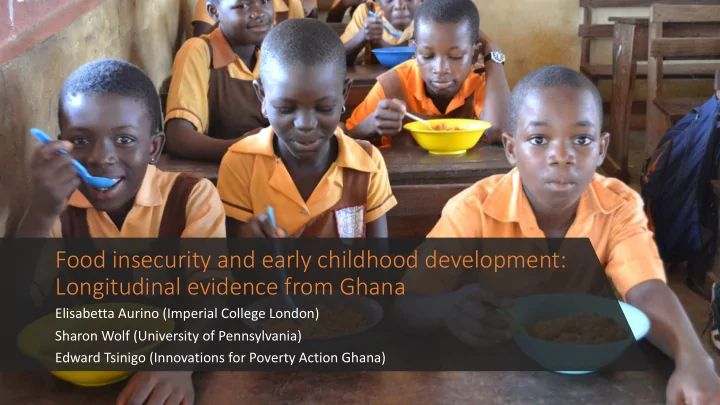

Food insecurity and early childhood development: Longitudinal evidence from Ghana Elisabetta Aurino (Imperial College London) Sharon Wolf (University of Pennsylvania) Edward Tsinigo (Innovations for Poverty Action Ghana)
Food security defined A situation in which “… all people, at all times, have physical, social and economic access to sufficient, safe and nutritious food which meets their dietary needs and food preferences for an active and healthy life ” (FAO, 2014)
Food insecurity and Early Childhood Development: Theoretical pathways Lower ECD investments Nutrition and health Food insecurity at home Reduced-quality of caregiver- child interactions Child stress and anxiety or child fatigued/lethargic
Country-level percentage of under-5 children at risk of poor development Poor development measured as failure to meet key cognitive and psycho-social health milestones Source: Lu et al 2016, Lancet Global Health
Yet, the evidence from SSA is extremely scarce! • Most evidence from US samples • Positive links between household food insecurity and ECD behavioural problems (King 2018; Slack et al., 2005; Whitacker et al., 2006), and decreased academic outcomes and psycho-social health in the early years (Jyoti et al., 2005) • In the context of LMICs , available evidence focuses on: • Household food insecurity and ECD diets/nutrition > other dimensions missing • Existing studies on schooling/learning/psycho-social health focus on adolescents • Surprisingly little is known about how exposure to household food insecurity during the early school years shapes children’s developmental trajectories! • No evidence from SSA with regards to the ECD period
What we do in this paper We contribute to filling this evidence gap by using a unique dataset tracking a sample of over 1300 Ghanaian children and their parents over three years to investigate longitudinal associations between household food insecurity trajectories and multiple domains of early childhood development in the lower primary school years Source: UNICEF/ UN04481/Acquah
The Ghanaian context • 1.2m people classified as food insecure and additional 2m (out of 29m population) vulnerable to extreme food insecurity • 19% child stunting, but up to 33% in more- deprived North • 33% of three- and four-year-olds in Ghana do not meet basic developmental milestones • Poor stimulation at home • Among highest rates of enrolment in ECD and almost universal primary, plus free school meals policy
Sample and methods • Sample from Quality Preschool for Ghana study (Wolf et al., 2018) • Greater Accra region • Children and caregivers first interviewed in 2005, when children aged 4-5y • Longitudinal follow-up for three waves in total (N=1,333) > children aged 7-8y • Outcomes (mean =0, SD=1): • Academic (maths and literacy) • Cognitive (short-term memory) • Socio-emotional (self-regulation, socio-emotional development)
Measurement of household food insecurity • Household food security in the previous 30 days measured through Household Hunger Scale, administered at each round to the caregiver • Cross-validated scale for measuring acute situations of food insecurity (Ballard et al., 2011) • Households classified as food insecure if HHS highlighted situations of moderate or severe food insecurity • Foci on occurrence and persistence of food insecurity: Source: USAID • Occurrence : household ever food insecure (vs never food insecure) (16% of the sample) • Persistence : household with transitory food insecurity (13%); household with persistent food insecurity (3%) ; household never food insecure (84%)
Key finding #1 Children that experienced food insecurity at any point had lower academic and cognitive outcomes Socio- Self- Short-term Maths Literacy * emotional regulation memory ** Regression coefficient 0,1 related to “Ever food development insecure household” *** 0,038 0,05 0 -0,05 -0,1 -0,114 -0,121 -0,15 -0,153 -0,2 -0,25 -0,231 *p<0.1; ** p<0.05; ***p<0.01 The figure above plot regression coefficients from separate OLS models that control for: wave 1 scores of each outcome; child gender and age in years; caregiver’s gender, age and education level; original treatment arm; household size; language of test administration. Robust confidence intervals in parentheses based on standard errors clustered at baseline school-level. Outcomes are standardised to have mean =0 and SD=1
Key finding #2 Even transitory spells of food insecurity predict decreased ECD outcomes Socio-emotional 0,15 Self-regulation Short-term Maths Literacy development Regression coefficient related to memory 0,1 household food insecurity 0,05 ** * *** * trajectory status 0 -0,05 -0,1 -0,15 -0,2 -0,25 -0,3 Transitory food insecurity Persistent food insecurity *p<0.1; ** p<0.05; ***p<0.01 The figure above plot regression coefficients from separate OLS models that control for: wave 1 scores of each outcome; child gender and age in years; caregiver’s gender, age and education level; original treatment arm; household size; language of test administration. Robust confidence intervals in parentheses based on standard errors clustered at baseline school-level. Outcomes are standardised to have mean =0 and SD=1
Discussion • First study examining this relation in SSA for ECD • Heterogeneity by skill and degree of persistence of household food insecurity, both of which are understudied topics • Cognitive skills including academic and memory development were most sensitive to food insecurity • For literacy, results were driven by persistent food insecurity, while for math and memory even transitory spells mattered • Consistent with study on Indian adolescents (Aurino et al., 2019) and studies that focus on the effects of school feeding on memory (Adolphus et al 2016) • Also in this sample general low prevalence of food insecurity • Accra region (though sample from poorest areas) • Measure of food insecurity used captures extreme hunger • School meals may have mitigated role of food insecurity on child learning and nutrition (Aurino et al., 2018; Gelli et al., 2019) • Relevant for current COVID crisis! • No school meals • Increase in food insecurity (especially in urban areas) • Key to target children with child-specific social protection
Thank you for listening! e.aurino@imperial.ac.uk
Recommend
More recommend